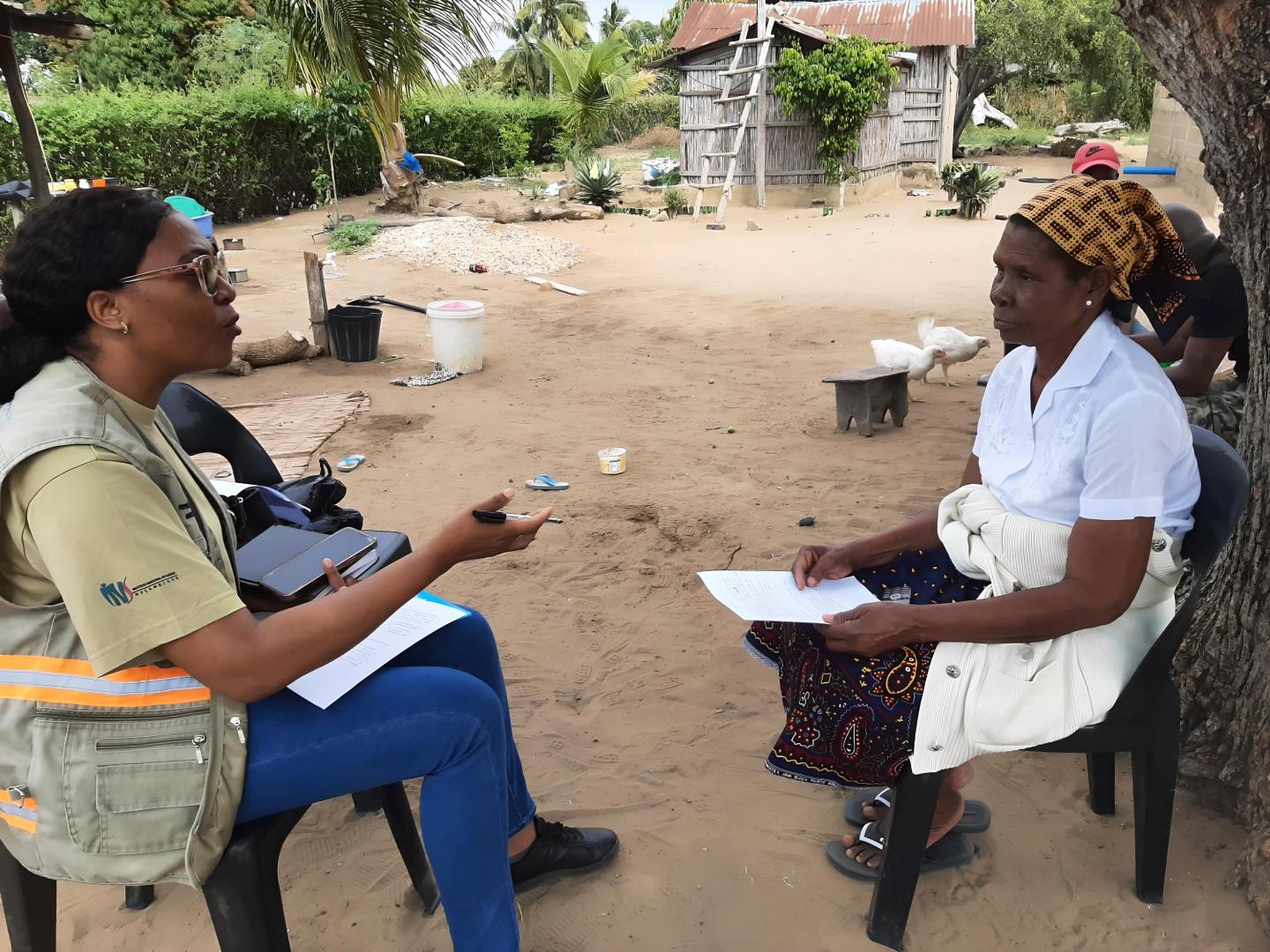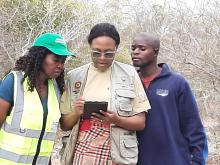Learn about Anália's Contribution to the Success of the Inhambane InCRÓNICA 2024 Data Collection

Anália Damião, mother of two daughters and head of the Community Involvement and Health Promotion Programme at the Provincial Health Directorate (DPS) in Inhambane between July and August, led the social mobilisation of the Prevalence Survey (InCRÓNICA) - STEPS in the province, training 60 community agents, among community leaders and health community workers, and covering an average of 10 km, on foot, every day for two (2) months.
Anália's commitment and tireless work were aimed at getting communities to join InCRÓNICA 2024 in Mozambique.
Anália Damião is the provincial coordinator of social mobilization for the Survey on Prevalence and Risk Factors for Chronic Noncommunicable Diseases (InCRÓNICA)/ STEPS. This activity began on 1 July 2024 in the city of Inhambane, one of the 13 districts of the province covered by the survey. In addition to the approximately 3-4 four-hour drive from the district headquarters to some areas, Anália covers an average of 10 kilometres on foot each day, through dense forest, crossing streams and fields as the areas are inaccessible by car.
Anália trekked for to fa flung areas to demarcate the Enumeration Areas mapped by the National Statistics Institute (INE) with support from community leaders or activists identified in the communities for this purpose. Inhambane Province had a total of 22 Enumeration Areas in l 13 districts covered.
In the District capital, Anália's first step was to make the Protocol of Entry, which consisted of presenting the objectives of her mission to the administrative and community structures, namely first to the health authorities, then to the Administrator's Office, then to the Police Command, then to the Administrative Post and finally to the Municipality. The second stage consisted of meeting with the leader or activist for training and together they travelled the entire perimeter of the Enumeration Area. Anália trained 32 community leaders and 28 activists. As soon as the Area had been demarcated and the activists trained, they began social mobilization to get the population to sign up to InCRÓNICA, informing them of the importance of the survey, the date on which the team of surveyors would start work in that Enumeration Area and asking for the families' cooperation.
Anália, a mother of two, is among 11 provincial social mobilization coordinators, who have been deployed across the country since 1 July 2024. She is in charge of the Community Involvement and Health Promotion Program at the Inhambane Provincial Health Directorate.
"As well as being sworn in to serve the community, Health Promotion and Community Involvement is an area that I love. I really enjoy working with the community and I feel it's an area of my vocation,’ she said, adding that she was very satisfied with the good coordination and as well as the provincial supervisor of the survey teams. ‘We are connected and well aligned,’ she emphasized.
For Dr Sérgio Mahumane, National Coordinator of Social Mobilization and Community Involvement, these areas are key parts of the process of implementing a survey, without which it would be difficult to achieve the desired coverage and acceptance of data collection in the field, especially when it comes to community-based survey that involves taking samples. It's a job of preparing communities, not only informing them about the survey process, but also sensitizing them to the need to know more about their state of health to improve the health system's response capacity.
The Social Mobilization and Communication Strategy designed for (InCRONICA - 2024) in Mozambique aims to inform and involve the population about InCRONICA, highlighting its objectives, importance, target group, implementation period in each specific location and procedures.
This strategy took into account the context of the survey's implementation, such as the fact that the period was dry and marked by community activities to harvest and prepare the fields for the next campaign, pre-election political processes and the instability caused by humanitarian crisis in the north of the country.
Dr Palmira Santos, General Coordinator of InCRÓNICA 2024, revealed that as a result of the process, 8% of the total planned target of 5720 people aged between 18 and 69 was achieved. The target group was selected from 260 Enumeration Areas in 126 districts spread across Mozambique's 11 provinces.
‘The population's adherence to this type of survey is of the utmost importance, because this is the only way we can get the real dimension of the problem from a representative sample. In this sense, the work of our social mobilization teams is an indispensable element in the success of the survey,’ she stressed, adding that
“Although all the conditions have been created to achieve significant coverage in order to produce credible results to inform the planning and decision-making processes, there is always an estimate of individuals who are absent or who refuse to take part in the surveys for various reasons,” said Dr Palmira.
Dr Tomas Valdez, Health Planning Advisor, in WHO Mozambique, thanked the entire team led by the INS in coordination with the National Institute of Statistics, the technical support from the three levels of the WHO (Country, African and General Headquarters) and the funding from Canada that enabled the implementation of In CRÓNICA 2024.
The WHO/Mozambique office was responsible for coordination and technical support, the WHO South Africa office supported in the local equipment procurement process, and the Regional Office in Brazzaville and the Headquarters of WHO in Geneva provided technical support for InCRÓNICA- STEPS.
Text and photography: Glória Moreira
O Representante da OMS em Mocambique e Dr. Severin von XYLANDER,
Rua Bejo Da Mulata, 73
P.O. Box 377, Maputo
Maputo, Mozambique
Telephone: (+258) (21) 492732/492165
Mobile: (+258) 823010710
GPN: 36821
afwcomz [at] who.int (afwcomz[at]who[dot]int)




